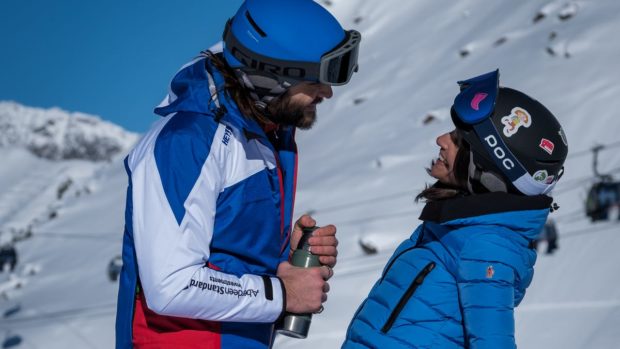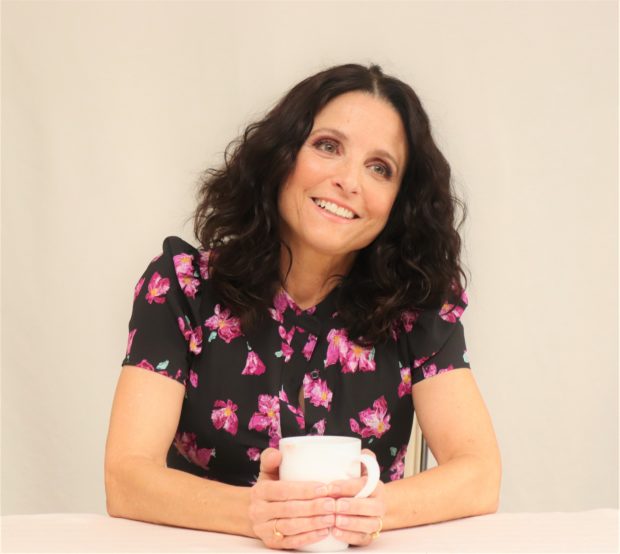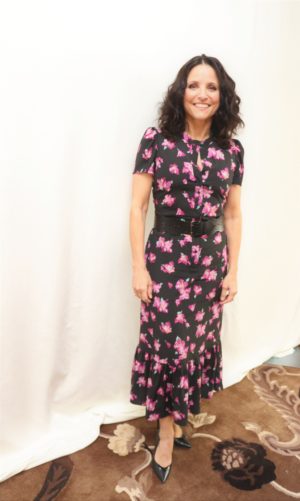‘Downhill’ costars Julia Louis-Dreyfus, Will Ferrell—she dishes on flirty men, he talks about being ‘un-male’
(First of two parts)
LOS ANGELES—Julia Louis-Dreyfus dishes on how she reacts to men who flirt with her; Will Ferrell talks about being “un-male” in one aspect.
The two comedy actors work together for the first time in “Downhill,” writer-directors Nat Faxon and Jim Rash’s comedy adaptation of the acclaimed 2014 Swedish drama, “Force Majeure.”
In Julia and Will’s version, they play a married American couple, Billie and Pete, respectively, who are on a ski vacation with their two young sons in the Swiss Alps.
As in Ruben Ostlund’s original, which earned a Golden Globe best foreign language film nomination, when a controlled avalanche comes hurtling down the mountain while the family of four is having lunch in a ski resort outdoor patio, Pete runs away and leaves his wife and kids.
Article continues after this advertisementThe rest of the film tackles Pete’s cowardice—how he refuses to admit it while Billie and her two kids grapple with Pete’s reaction in the face of danger. Shot in the beautiful Alps, specifically in the picturesque Austrian town of Ischgl near the Swiss border, “Downhill” also stars Miranda Otto, Zoe Chao, Zach Woods, Julian Grey, Ammon Jacob Ford and Giulio Berruti, as a hunky Italian skier who seduces Julia’s Billie.
Article continues after this advertisementWill, who is married to Swedish actress Viveca Paulin with whom he has three sons, will be seen next in another movie shot in Europe. In “Eurovision,” he and Rachel McAdams star as musicians who compete in the world’s biggest song competition.
Julia, on the other hand, leads the voice cast of Pixar’s “Onward,” which is directed by Dan Scanlon. She is married to fellow comedian, “Saturday Night Live’s” Brad Hall.
Excerpts from our interview with Julia:
What about “Force Majeure” stayed in your mind and made you think it would be a good film to remake?
That original film is a work of art. The fundamental aspect of the story is what I found so intriguing. It was so compelling to retell with an American lens. And that was the idea that reality is one way and you are looking at life through a certain lens, then that lens is removed and all of a sudden, your reality shifts and what you were seeing is altered considerably.
What does that do to the characters within the story? That’s what the movie is about. That was a very intriguing idea to me. And then to put an American spin on it, which is not better or worse—it just is—was an opportunity not to be missed. I was grateful to be given the opportunity, frankly.
Speaking of looking at life through a different lens—how different would this movie be if it was the mother who ran away from what looked like an avalanche coming and the father stayed with the kids?
Oooh, that’s an interesting story, maybe we have to remake it again (laughs). This movie is about equal opportunity when it comes to bad behavior (laughs). That was very important to me in telling this story, that we didn’t depict the wife as an angel. Because they (both parents) are not. My character is not and I thought it would be an interesting story to be told, slightly altered, so that both of them make bad decisions.
I’m not sure what’s worse or what’s better, but that event starts the unraveling of a sweater, shall we say, and chaos ensues. Bad decisions are made on the heels of that. Because nobody’s really talking about anything frankly and I thought that would be interesting.
That was very much on my mind, to get a better understanding of why Pete does what he does, not only in the actual moment of running away. But then, why he does what he does afterward, which is to deny the truth. And then what the wife, Billie, does on the heels of that crisis and the bad decisions she makes as a result of her world being upended.
In the scene where Pete and Billie finally have it out in front of their couple friends, one of the most delicious audience reactions happens when Billie goes and gets their children to tell the “truth.”
By the way, were you at Sundance? I was shocked by that reaction. I guess it was the first time that the film was screened in front of 1,500 people, but I was like, wow, the audience is really on board with this whole scene.

A hunky Italian skier (Giulio Berruti, left) flirts with Billie (Julia Louis-Dreyfus) in “Downhill” —FOX SEARCHLIGHT
Let’s talk about Guglielmo (Giulio Berruti), the Italian skier who seduces your Billie. I’m sure you have your share of men who flirt with you. How do you react to flirty men?
I kiss them all, just like she did in the movie (laughs)! Listen, it’s nice to be flirted with. But I don’t act on it. I’m very happily married, so I don’t go around kissing guys who flirt with me (laughs). So, I can’t tell you a particular moment when someone was flirting with me. Nothing comes to mind.
And actually, even if it did, I wouldn’t share it (laughs). I respect my marriage and my husband too much to do so.
There is a scene where your character goes naked in a sauna. It’s a common sight in Europe. Would you go naked in a sauna?
Well, if it’s only women, I will go naked in the sauna. But when we were in Austria, I walked into the sauna, and there were two naked men there. I just went, boop, turned around and out I went (laughs). So, I’m not comfortable in that situation, but no disrespect.
What’s your next project?
After this movie, I have “Onward,” the Pixar film. Then, I’m working with Apple (TV Plus) to develop some material with them over the next couple of years, which I’m excited about.
So, you are returning to TV.
TV, or now as I like to call it, computer (laughs).
(Conclusion tomorrow)

